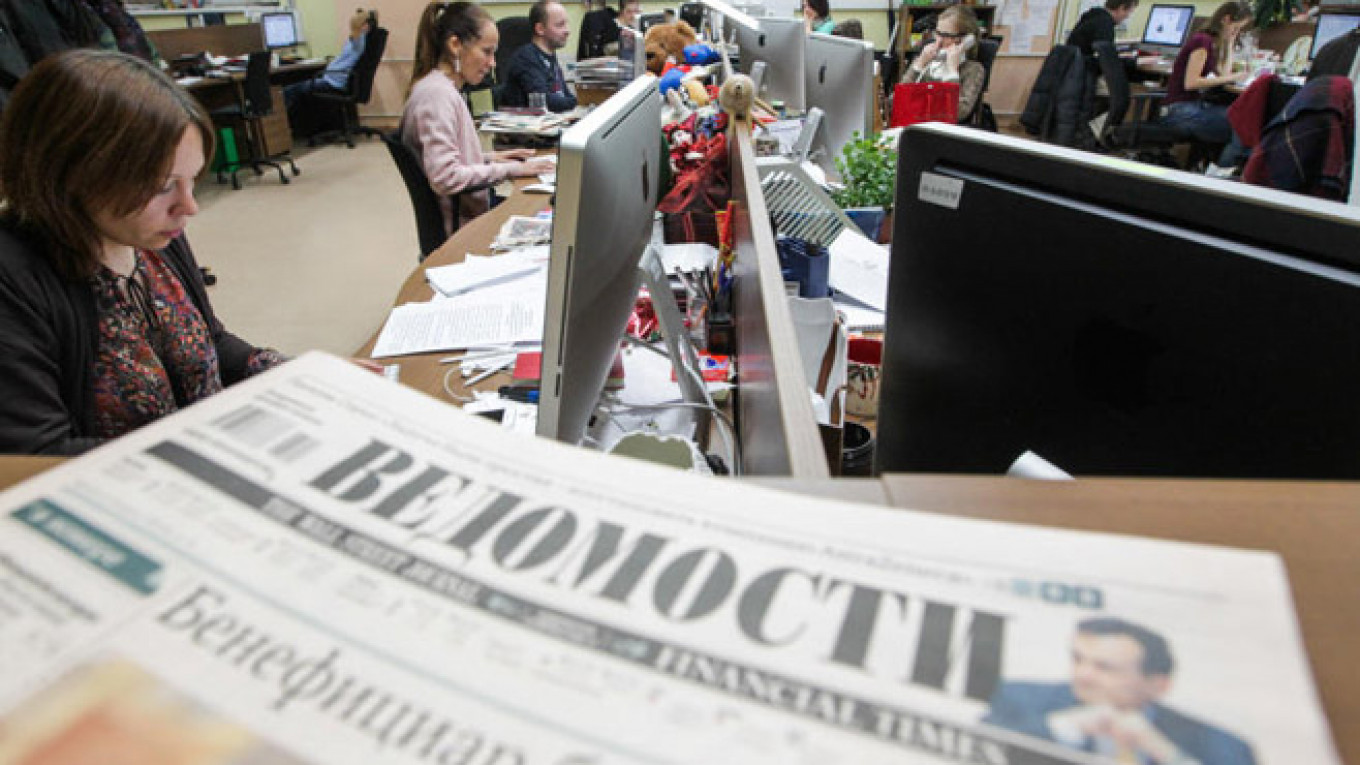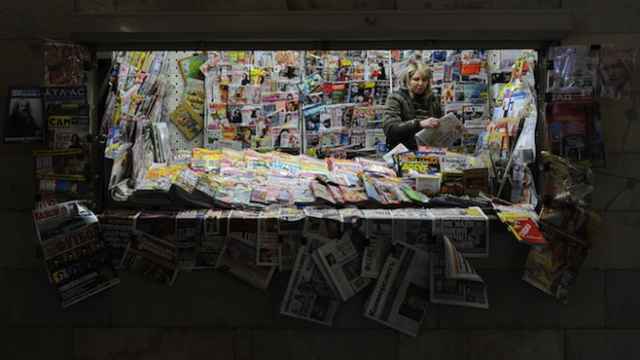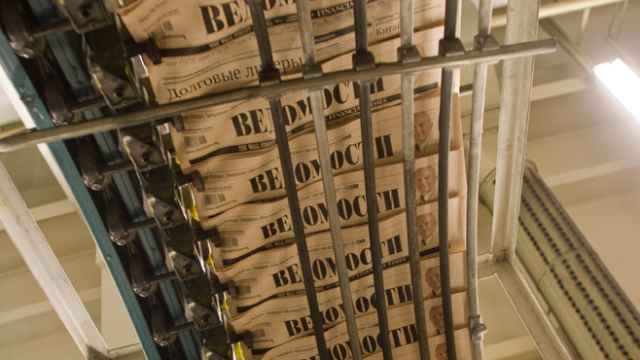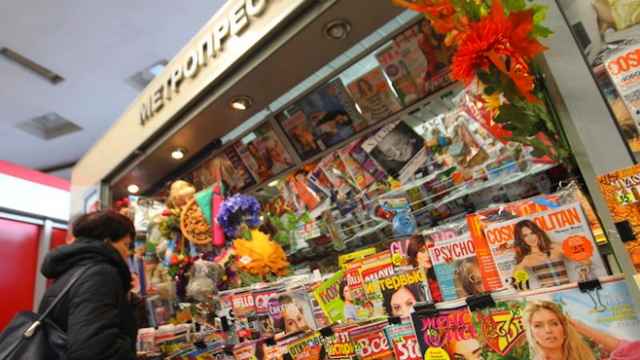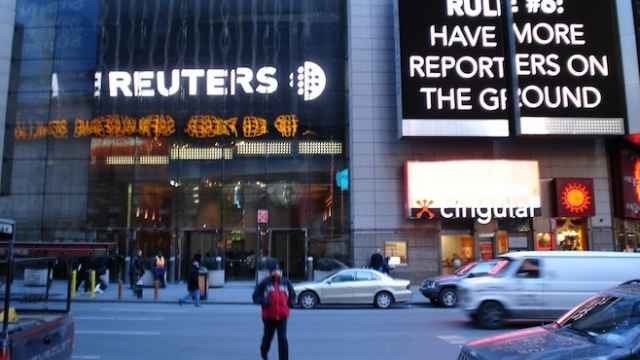Influential business newspaper Vedomosti, one of the last Russian media outfits not yet under the sway of the Kremlin, is facing escalating political pressure amid a new media law that targets its foreign owners and the imminent sale of a major shareholder's stake.
One of the few outlets as yet untouched by the state's expanding presence in the media industry, Vedomosti is jointly owned by the Financial Times Group, Dow Jones and Finland-based Sanoma.
With Sanoma currently negotiating to sell its Russian assets, attention is focused on how the Financial Times Group and Dow Jones will react to a new law signed by President Vladimir Putin on Wednesday that compels foreign owners of Russian media holdings to reduce their stakes to 20 percent before the end of 2016.
Vedomosti's founder, a bidder for Sanoma's stake in Vedomosti and market analysts told The Moscow Times that the Russian-language newspaper's editorial independence will almost certainly be compromised during the upcoming shareholder reshuffle.
"It's a political decision, and the presidential administration is probably behind it," Vedomosti chief editor Tatyana Lysova said last week when asked about the new media law.
"Clearly Vedomosti's current shareholder structure is now impossible."
State-controlled Gazprom-Media and companies affiliated with financier Yury Kovalchuk, reportedly a close personal friend of Putin, are preparing to acquire Vedomosti, possibly through an intermediary, Bloomberg reported Thursday, citing three unnamed sources.
Foreign Exodus?
Vedomosti's founder, Dutch citizen Derk Sauer, told The Moscow Times on Thursday that the new law, falling advertising revenues from slowing economic growth and the spiraling risks of operating in Russia meant the Financial Times Group and Dow Jones were likely to exit.
"Could there be a Russian owner who can guarantee editorial independence? Maybe. But I don't see that person at the moment," said Sauer, who now heads Russia's RBC media holding.
The Financial Times Group, a subsidiary of Pearson, and Dow Jones, owned by Rupert Murdoch's News Corp, both declined to comment on their plans for Vedomosti or on their commitment to the Russian market.
The Financial Times Group and Dow Jones are the respective owners of the Financial Times and Wall Street Journal newspapers, for which Vedomosti serves as a Russian analogue.
Foreign shareholders have played a key role in shaping the Russian media landscape since the end of the Soviet Union, often providing a degree of protection from political pressure.
Media analysts were pessimistic about the chances of preserving foreign control. "The owners of Vedomosti can't avoid following the law," said Andrei Richter, a journalism professor at Moscow State University. "There is no way out."
If the Financial Times Group and Dow Jones pull out of Vedomosti it will be disastrous, said a source familiar with the shareholders' negotiations. "If they leave, we're f---ed," he said, referring to the paper's editorial independence.
Other Options
Vedomosti editor Lysova said the Financial Times Group and Dow Jones were caught off guard by the speed with which the new media law was passed, but were not intending to leave.
"They will try and find ways of preserving Vedomosti and of staying in the [Russian] market … That's what they said," Lysova said.
Vedomosti is known for articles critical of the government and probing investigations into corruption and tycoons close to Putin. But it remains influential among the Russian elite and published an interview with Prime Minister Dmitry Medvedev as recently as last month.
One option for the paper's shareholders is to reshuffle the holding in such a way as to comply with the new law while retaining a degree of control that would guarantee editorial freedom.
Leonid Bershidsky, the first editor-in-chief of Vedomosti who went on to launch Forbes Russia, said that sort of franchise arrangement might be permitted.
"The obvious scheme that occurs to me is transferring control to the publisher and editor and then raising license fees to the level of previously extracted dividends," he said.
Another possible scenarios is re-registering Vedomosti as a foreign news organization, which would oblige all its journalists to receive accreditation from the Foreign Ministry.
Bershidsky added that divesting their stakes in Vedomosti could be dangerous for the Financial Times Group and Dow Jones. "Selling to Putin cronies is not something they would do to their reputations," he said.
Sanoma Sale
Despite the new media law, one of the bidders for Sanoma's Russian assets is Peter Gerwe, a U.S. citizen who has been working in the Russian media market since 1991.
"I am bidding on my own, and I am foreigner," he told The Moscow Times in an e-mail Thursday.
Gerwe has repeatedly denied that he is operating as a front for a Russian group, but declined to comment publicly on how he would be able to work within the framework of the new media law.
Sanoma entered Russia in 2005 when it bought Independent Media, which holds a stake in Vedomosti and controls publications including Esquire, Cosmopolitan, National Geographic and The Moscow Times.
A spokesperson for the Helsinki-based group declined to comment on reports of Kremlin-connected companies bidding for Vedomosti, and insisted that Sanoma's sale of its Russian assets, originally announced last year, was not yet complete.
"The process is still ongoing," Robin Janszen, vice president for communications at Sanoma, said Thursday.
Derailing Sanoma's Plans
The new media law, however, has complicated Sanoma's already protracted sale of Independent Media, Russia's second-largest publishing house, by distorting prices and scaring off bids from abroad.
Foreign media giants including Hearst and Axel Springer were reported earlier this year to be interested in the asset, which has been on the market since 2013.
Sanoma chief executive Harri-Pekka Kaukonen said in July that a buyer would be found by the end of September.
The effect of the new media law on a valuation of Independent Media is unknown, but shares in foreign-owned CTC Media, Russia's sixth-largest television station, have plunged more than 30 percent since the law was first proposed in mid-September.
Some have even characterized the new media law as an attempt to influence the outcome of Sanoma's sale.
"Chronologically it fits," said Vedomosti editor Lysova. "The law was passed very quickly at the very moment when Sanoma was supposed to make a final decision."
Businessmen with close ties to the authorities have long been interested in Independent Media, according to a Moscow media industry source. "Some of the participants in the process [of the sale] were sponsored by the Kremlin," he said. "Sanoma rejected one strange offer after another."
Ramping Up State Control
Independent news organizations in Russia have come under mounting pressure this year as the Kremlin has moved to tighten its control over the country's already heavily regulated media sector.
The chief editor of Lenta.ru, Russia's most popular news website, said she was forced out of her job in March and has subsequently left Russia to set up a new media project in Latvia. Independent television channel Dozhd shed viewers in January after it was abandoned by cable operators in what executives at the channel described as an orchestrated Kremlin attack.
Last year, Putin signed a decree shuttering one of the country's oldest news agencies, RIA Novosti, which had become known as one of the most liberal state-owned media outlets.
Veteran Kremlin media handler Mikhail Lesin, who is also credited with setting up Russia's international broadcaster RT, was appointed to head industry giant Gazprom-Media last year. Lesin denied reports Thursday that Vedomosti could be acquired by Gazprom-Media."Vedomosti and the newspaper business do not interest me," he said, according to the Dozhd television channel.
'Hard to Kill'
Vedomosti editor Lysova, who has been involved in the newspaper for all 15 years of its existence, warned that uncertainty was beginning to impact decisions about new projects and new hires.
While the paper has a relatively small circulation of 75,000, it has made money since the first year of its existence — an attribute that some hope will encourage the Financial Times Group and Dow Jones to favor further participation.
If these two influential Western media partners stand by Vedomosti, they have certain powers available to them to help preserve the paper's editorial independence.
Unlike the Financial Times Group and Dow Jones, the third shareholder, currently Sanoma, is excluded from the decision to appoint Vedomosti's chief editor.
The Financial Times Group and Dow Jones are also not obliged to simply acquiesce to a replacement for Sanoma. Other options include boosting their stakes to 50 percent each or co-operating in a management buyout, according to a Moscow media source.
"Vedomosti is very resilient and hard to kill," said former editor Bershidsky. "But I guess an ax would do it if conscientiously applied."
Contact the author at [email protected]
A Message from The Moscow Times:
Dear readers,
We are facing unprecedented challenges. Russia's Prosecutor General's Office has designated The Moscow Times as an "undesirable" organization, criminalizing our work and putting our staff at risk of prosecution. This follows our earlier unjust labeling as a "foreign agent."
These actions are direct attempts to silence independent journalism in Russia. The authorities claim our work "discredits the decisions of the Russian leadership." We see things differently: we strive to provide accurate, unbiased reporting on Russia.
We, the journalists of The Moscow Times, refuse to be silenced. But to continue our work, we need your help.
Your support, no matter how small, makes a world of difference. If you can, please support us monthly starting from just $2. It's quick to set up, and every contribution makes a significant impact.
By supporting The Moscow Times, you're defending open, independent journalism in the face of repression. Thank you for standing with us.
Remind me later.



